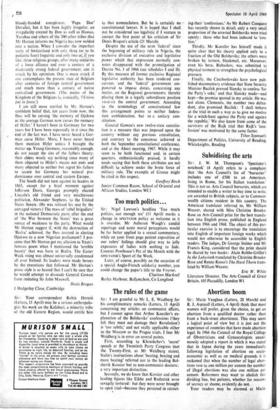Sir : Your correspondent Robin Hortoil (Letters, 11 April) may
be a serious anthropolo- gist: his work on the Kalahari, a minority tribe of the old Eastern Region, would entitle him to that nomenclature. But he is certainly no constitutional lawyer. It is hoped that I shall not be considered too legalistic if I venture to correct the first point of his criticism of Sir Denis Brogan's article (21 March).
Despite the use of the term 'federal' since the beginning of military rule in Nigeria, the exclusive division of executive and legislative power which that expression normally con- notes disappeared with the promulgation of Decree No. 1 of 1966 (see schedules I and II). By this measure all former exclusive Regional legislative authority has been rendered con- current, and the 'federal' government em- powered to impose duties, concerning any matter, on the Regional governments; thereby placing them in a legally subordinate position vis-a-vis the central government. According to the terminology of constitutional law this arrangement points to neither federa- tion confederation, but to a unitary con- stitution.
General Gowon's new twelve-state constitu- tion is a measure that was imposed upon the country without any previous consultation, and contrary to the consensus achieved at both the September constitutional conference, and at the Aburi meeting, 1967. While it may seem to be both functional and, in certain quarters, enthusiastically praised, it hardly needs saying that both these attributes are not difficult to achieve under the brute force of military rule. The example of Greece might be cited in this respect.
Geoffrey' Birch Junior Common Room, School of Oriental and African Studies, London WC1










































 Previous page
Previous page